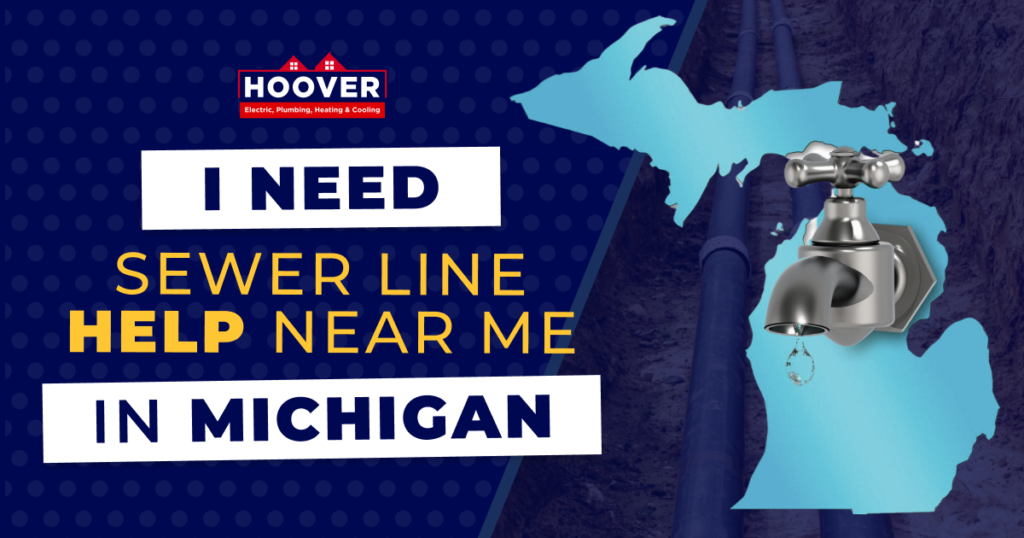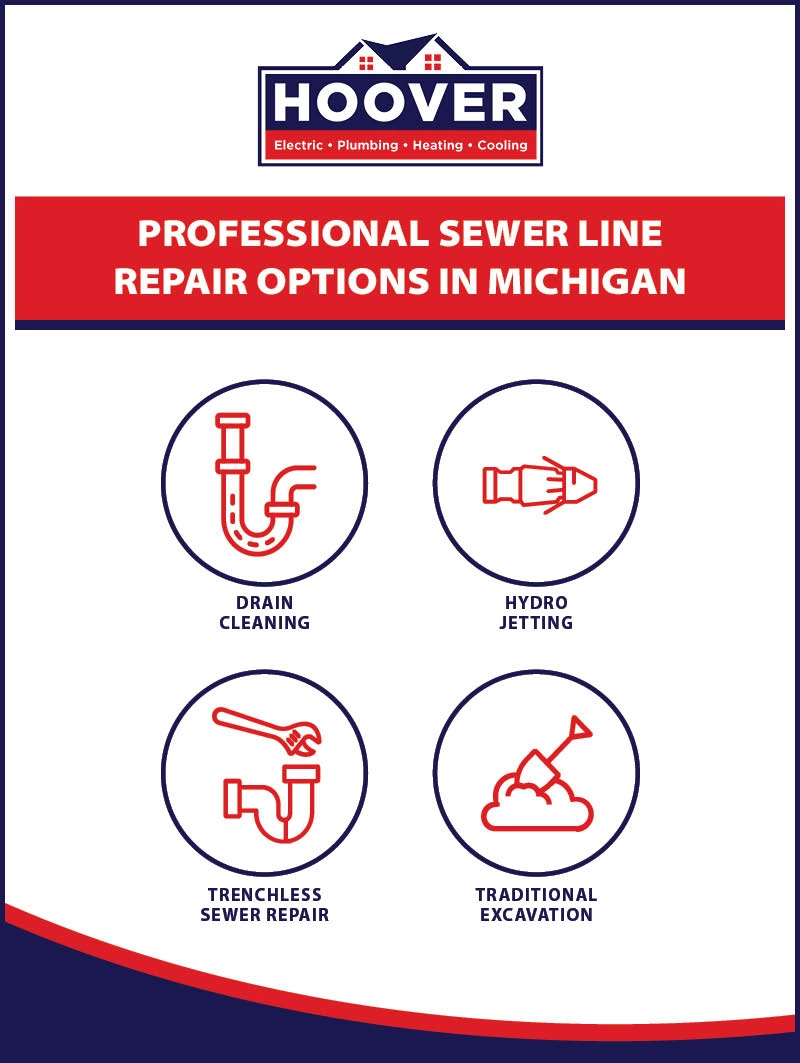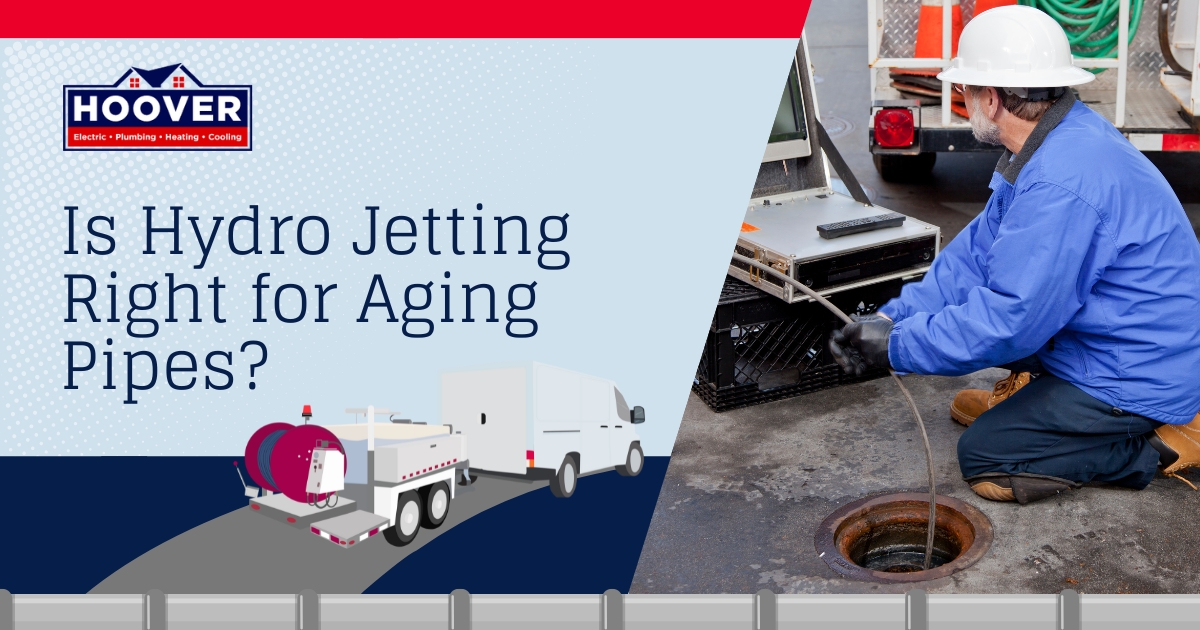
Sewer line problems often go unnoticed until they cause flooding yards, overflowing toilets, and other sewer line emergencies in Michigan homes. At Hoover, we recognize the urgency of emergency sewer repair. Learn the signs, causes, and risks of sewer line problems and when to call our team for help.
Recognizing the Signs of Sewer Line Trouble
Stay ahead of major plumbing breakdowns — look for these signs of sewer line trouble to arrange prompt sewer line repair:
- Frequent clogs: Regular clogs and overflowing toilets indicate a blockage within a fixture’s specific line or deeper in your plumbing system.
- Running toilet: If the line has a blockage, the toilet struggles to discharge its contents and runs overly long or indefinitely.
- Slow drainage: Slow drains point to blockages in your sewer line.
- Unpleasant odors: Strong and foul odors from inside or outside your home suggest a sewer line leak or break.
- Gurgling drain sounds: Gurgling from toilets and other fixtures results from trapped and released air in your pipes, suggesting clogs or breaks.
- Overly-healthy yard: Broken sewer lines leak organic matter into your yard, which acts as fertilizer and causes patches of thriving grass or other vegetation.
- Multiple back ups: Back ups in multiple fixtures are a clear sign of a blockage along in your sewer line.
Understanding the Causes of Sewer Line Issues
Knowing the causes of sewer line issues helps Michigan homeowners troubleshoot, avoid further damage, and find an effective solution.
Blockages
Organic matter and other materials build up over time and develop a layer of scum or scale along the pipes. Without proper cleaning, this layer thickens and reduces space within the pipe to the point of slowing or blocking drainage altogether.
Improper disposal practices
Sewer lines aren’t meant for garbage, and poor disposal habits lead to clogs and sewer backups. Many items and materials aren’t meant to go into your sewer lines, including:
- Cooking grease, oils, paint, varnish, paint thinner
- Sanitary products, paper towel, and baby wipes
- Food waste
Disposing of these items and materials down your drains accelerates growth of sludge in the lines, therefore increasing the risk of narrowing pipes and clogged sewer lines.
Tree roots
As tree roots grow, they may intersect with and damage sewer lines, particularly lines that are already corroded or weakened. Tree roots can grow into connection points in sewer lines, potentially causing both blockages and burst pipes.
Pipe damage or wear
While sewer pipes have long lifespans, various factors damage or accelerate wear to your lines. Examples of pipe damage include:
- Aging materials: Certain pipe materials are prone to damage in certain conditions. For instance, clay pipes are porous and more likely to attract tree roots, while cast iron pipes are vulnerable to rust and deterioration.
- Corrosion: Exposure to moisture, chemical reactions, and other factors cause metal pipes to corrode and weaken.
- Shifting soil: Soil movement can shift and misalign pipes, leading to damaged connections and lines.
- Severe climate: Severe temperature changes impact pipes. High temperatures cause plastic or clay pipes to expand, crack, and rupture, while freezing temperatures cause pipes to burst.
The Risks of Ignoring Sewer Line Problems
Ignoring sewer line problems can lead to more than inconvenient interruptions to your plumbing system’s regular function.
Health and environmental hazards
Sewage contains harmful bacteria, viruses, and other contaminants. Exposure to these contaminants due to sewer backups or pipe damage can result in illnesses for your household. Sewage seeping into the ground may also contaminate soil, groundwater reservoirs, and wells, impacting local ecosystems and public health.
Property damage
Undetected and unaddressed leaks and pipe damage may result in unstable ground from soil erosion and sinkholes. This instability may shift and damage your home’s foundation, walls, and other structures, leading to inconvenient and costly repairs. Some repairs require excavation, in which case your landscaping also suffers.
Sewer Line Repair Options in Michigan
Sewer line repair options include a range of specialized techniques, tools, and technology. The right repair option depends on your unique circumstances. Expert plumbers use plumbing-specific and waterproof cameras that feed into your pipes. Providing life footage, these cameras allow your plumber to explore sewer lines and detect the exact problem without digging up the whole system.
Consider these professional sewer line repair services:
- Drain cleaning: Using a professional plumbing snake or auger, plumbers can remove clogs deep in your sewer lines.
- Hydro jetting: This advanced technique uses high-press water to clean pipes, removing blockages as well as scrubbing sludge and scale buildup.
- Trenchless sewer repair: Pipe bursting and pipe relining are minimally-invasive trenchless repair techniques that permanently fix damaged pipes.
- Traditional excavation: Generally reserved for extensive sewer line replacement, excavation involves digging up your system.
Preventing Future Sewer Line Problems
These preventative measures help extend your sewer’s lifespan and avoid future repairs:
- Use snakes to remove superficial clogs
- Avoid harsh chemical cleaners that damage pipes
- Don’t plant trees or shrubs near sewer lines
- Practice proper waste disposal for grease, cleaning products, and other materials
DIY vs. Professional Sewer Line Repair
Minor clogs may be isolated and easily fixed but professional intervention is necessary for more significant repairs. DIY solutions may not address underlying problems and result in progressively worse symptoms and damage. Licensed plumbers at Hoover have the expertise and technology to diagnose and repair sewer line troubles.
Finding Reliable Sewer Line Help in Michigan
Consider these tips to find reliable plumbing providers:
- Check credentials: Ensure your plumber is licensed, insured, and otherwise qualified for sewer line repair.
- Look for reviews: See what other customers liked about their experiences with their plumber.
- Ask about maintenance: Explore their maintenance plan options for solutions that help keep your system in optimal shape.
Call Hoover for Sewer Line Repair in Michigan
At Hoover Electrical, Plumbing, Heating & Cooling in Michigan, we help with anything from water pressure issues to flooding water in your basement. Take advantage of free estimates, expert plumbing skills, and flexible financing. Contact us or book online today.
FAQ Section
What’s the difference between sewers and storm drains?
Sewers and storm drains are both part of water management but serve different functions. Sewers handle and treat wastewater, and storm drains manage rainwater and surface runoff.
How often should I schedule sewer line inspections?
Schedule a sewer line inspection every one to two years, especially if you notice concerning signs or have an older system.



